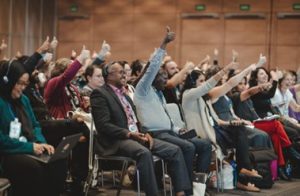Let’s accelerate the change – and only do flexible funding
05 Jun 2024
Charlotte Timson is Vice-Chair of the Board of Trustees of BOND and was Chief Executive of Transform Trade. She has worked on social justice issues for 20 years, across Africa and South Asia. Her recent work has focused on structures of power in trade and aid systems. She is passionate about developing alternative business models and approaches that enable a shift of power within development. (Transform Trade began life as Traidcraft Exchange, and has been working on trade justice since 1985 as part of Traidcraft. It split from Traidcraft in 2018 and rebranded in 2022.)
Bogotá: Talking about what really matters

Charlotte Timson
“I loved the Bogotá #ShiftThePower Global Summit and felt I learnt a lot. The people I met were from different communities from the ones Transform Trade usually works with, because we work on trade and many of the people at the Summit work in humanitarian aid and development.”
“Also, we don’t work in Latin America, so it was good to meet Colombians and other Latin Americans – they are talking about trade, human rights, minerals, exploitation of communities – the things that trade justice is all about.”
“Being at the Summit and connecting with organizations working in extremely challenging contexts brought home how inadequate the current funding system is. Change happens on the ground by people’s organizations who are fighting for justice. The vital work they do everyday responding to community needs can’t be compartmentalized into project grants and frameworks.”
“I came away thinking we (Transform Trade) need to accelerate our transformation and make providing flexible funding everything we do. I don’t want to do restricted funding grants anymore.”
Going back to our roots
The transformation of the organization began in 2020, when it committed to a major participatory review of its programmes, reporting, fundraising, communications and campaigning work. The changes this review have led to are not so much a new direction as a return to the organization’s roots “as a radical outsider”, as Charlotte put it in a blog post marking a year from their rebrand.
“As an organization, we had started off working with businesses struggling to trade fairly, supporting producers to increase their sustainability and profitability. But over time, we started looking at local markets and national markets. And by getting into livelihoods we moved into development programmes.”
“Over time we had set up country offices and our model had become more like that of a traditional INGO, which sat at odds with our values.” The review revealed that “our work had become incoherent and we needed to refocus.”
The challenge of shifting culture and attitudes
Transforming the organization has been a challenging process, Charlotte says, and made more difficult by the financial woes of partner organization Traidcraft PLC, which went into administration in March 2023.
“So much of this transition is around cultural and attitude shifts. We are now working in a different way with partners, we have internationalized our board and diversified our senior leadership team, we’ve made progress, but it takes time to shift how we think about things. The people side of these transformations is often underestimated.”
“We did a huge participatory process, there have been some quite challenging conversations, and faced some internal resistance, but we have navigated this cultural shift as a collective. Doing this process together has been really critical and finally we are clear in our strategy that we are not going for growth but are prioritising high quality, trust-based partnerships that are flexible and responsive to partner needs.”
This means Transform Trade closing down areas of programming that are outside the organization’s core mission. “Downsizing is really hard, and it’s not something that usually counts as a success. There’s a sense of loss in the organization. People who have worked for years in a remit and done well are having to close down what they have been doing. It’s been really tough but we are well on our way now.”
Change is coming to the INGO sector
In different ways and at different speeds, the INGO sector is asking itself the same questions as Transform Trade has. “Among INGOs, I feel there’s a bit of a divide now. Some organizations are just going to try to transform, particularly the smaller ones like us, they will just go all in, take the risk and see where the journey takes them.”
“I think this is less the case with the major INGOs. But I wonder how sustainable the sector is currently. The competition for resources is increasing, there are so many INGOs, you have to ask if we are being as effective as we can be with the resources available. Also understandably people are increasingly looking at issues and poverty in their own countries.”
The Summit was a good experience after a hard year or more. “I came back reenergized about the purpose [of our work] and that’s what you lose day-to-day. The Summit reaffirmed my belief that there are amazing people doing amazing work – and what was so powerful is that people are finding their own solutions. The speed of trust moves much faster and needs less resources. There’s not one grand model or plan that we can take forward, one that sucks resource into maintaining some infrastructure. This is a different way of working that is genuinely community-led.”
Read more in the series #RoadFromBogotá: Perspectives on how INGOs are faring as they work to #ShiftThePower and the accompanying series #RoadFromBogotá: Perspectives on how CSOs are faring as they work to #ShiftThePower




